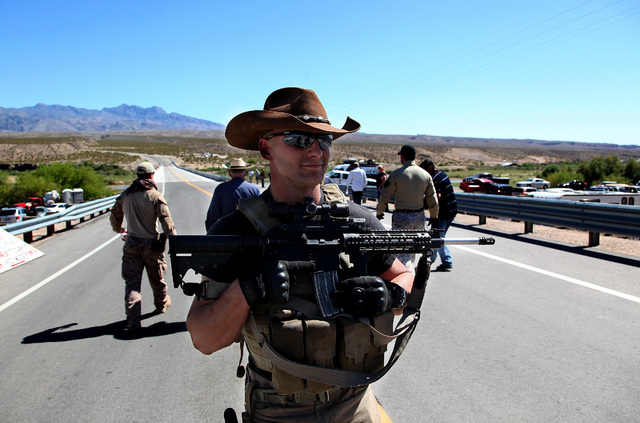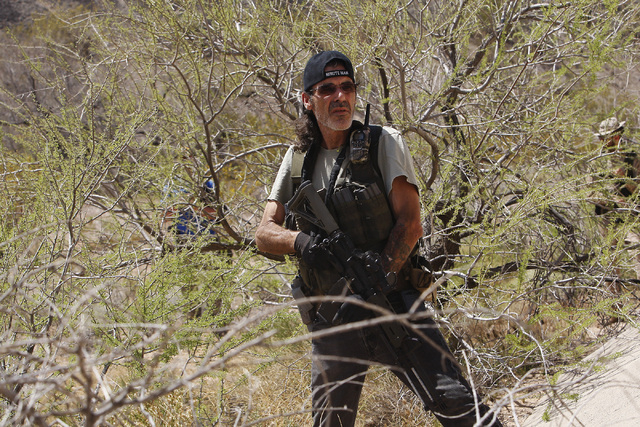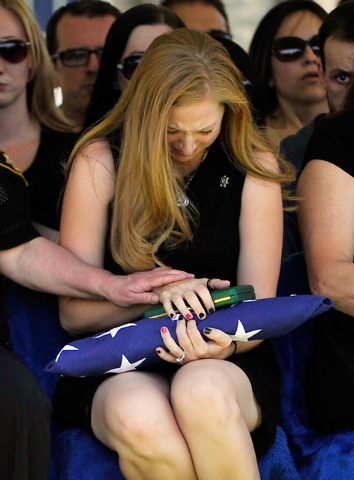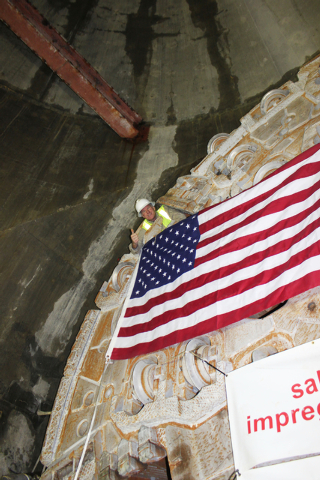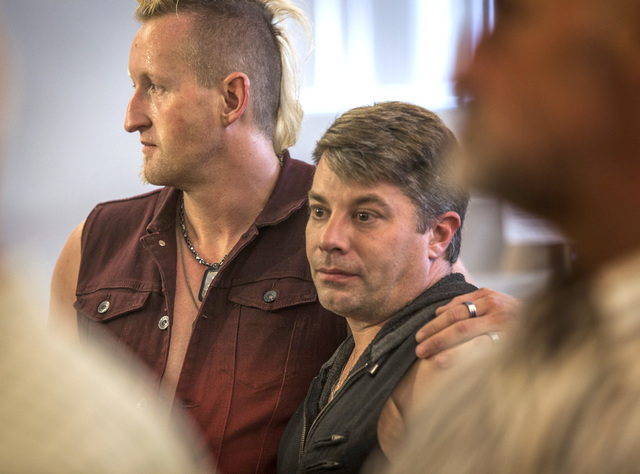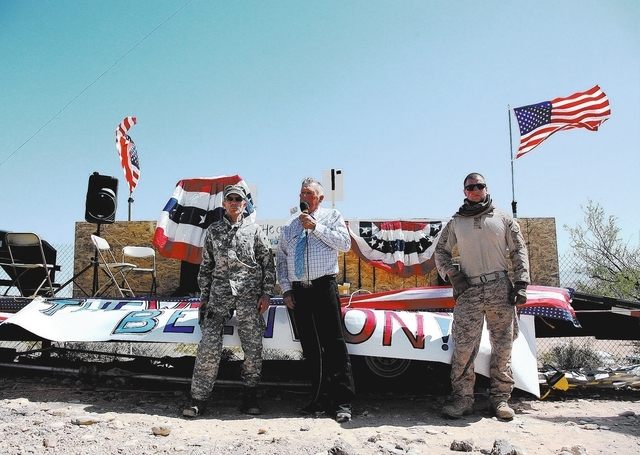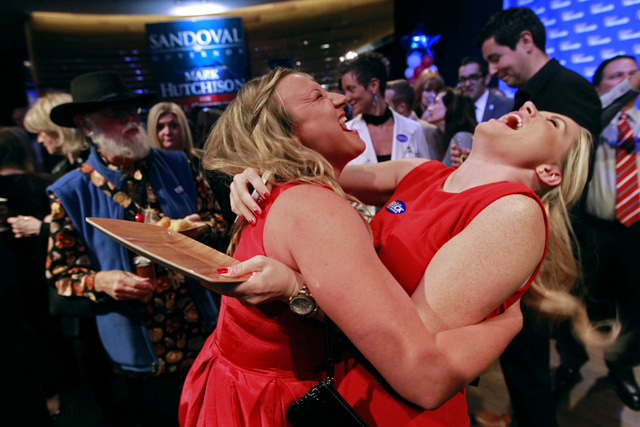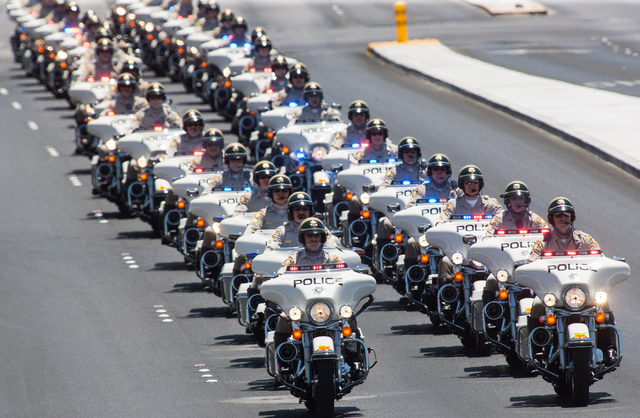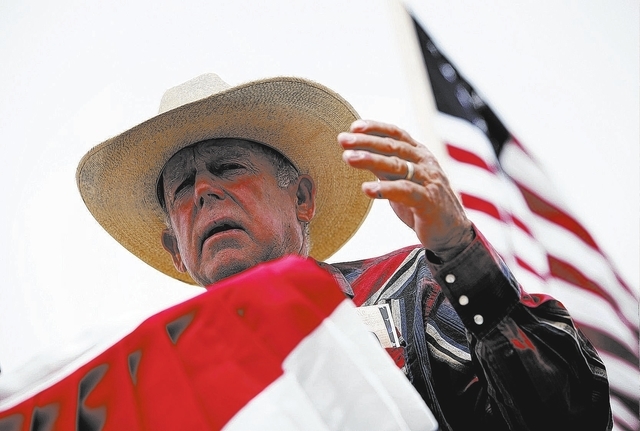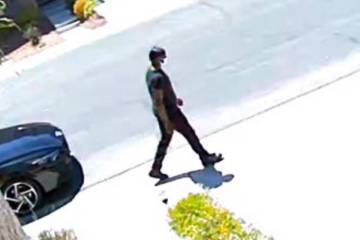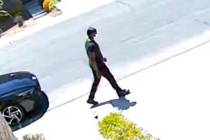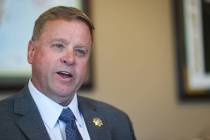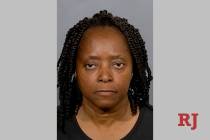Vegas cop killings, Bundy standoff among top 10 news stories for 2014
A shooting rampage that left two Las Vegas police officers, a good Samaritan and the two attackers dead, a standoff between the feds and a Southern Nevada rancher, the legalization of gay marriage in the Silver State, and a political storm that left Republicans in charge of the Legislature and all state offices topped the news in 2014.
In a year when Nevada marked the 150th anniversary of statehood, the defeat of a proposed margins tax to fund education in Nevada, the tumultuous final full year in office of Las Vegas Township Constable John Bonaventura, the end of District Judge Steven Jones’ judicial career, and revelations of the Clark County district attorney’s office writing checks for witnesses at criminal trials also landed on the list of the top stories of the year.
Review-Journal reporters were asked to pick the hottest stories on their beats. Here is their top 10:
A shooting rampage in Las Vegas left five dead in June, including two Metro officers, a man who tried to intervene, and both shooters.
Metro officers Alyn Beck, 41, and Igor Soldo, 31, were executed June 8 while eating lunch at CiCi’s Pizza, 309 N. Nellis Blvd. Married couple Jerad and Amanda Miller were the attackers.
The Millers ran from the pizza parlor and into the Wal-Mart across the street where they were confronted by Joseph Wilcox. Wilcox, 31, pulled out a pistol and moved toward Jerad Miller, 31, but was shot and killed by Amanda Miller, 22, as he approached.
Jerad Miller was killed by police and Amanda Miller took her own life inside the Wal-Mart.
A long-simmering dispute between federal range managers and Clark County rancher Cliven Bundy mushroomed into international news when the Bureau of Land Management moved to round up his cattle in early April.
The action began with BLM’s closure of some 600,000 acres of federal land where Bundy has been running his cattle illegally for 20 years without a permit or paying any grazing fees.
As a crew of contract cowboys began collecting the scattered animals, a defiant Bundy compared the federal government to cattle rustlers and welcomed armed militia members to rally at his side.
The standoff nearly ended in a shootout April 12 when Bundy supporters, some of them armed, marched on the BLM’s holding pens and were met by a line of law enforcement officers. Federal authorities quickly backed down, canceling the roundup, allowing the cows to be released and briefly turning Bundy into a conservative folk hero.
His support promptly vanished two weeks later when the rancher used his own daily press conferences outside Bunkerville to voice a string of racist rants.
By year’s end, Bundy had been widely denounced and mocked by everyone from President Barack Obama to Mad magazine, but his cattle remained free to roam.
On Oct. 7, in one of the biggest, most dramatic social upheavals in Nevada history, the state’s ban on same-sex marriage was found unconstitutional, ushering in a wave of euphoria and a rush to marriage bureaus by same-sex couples.
Although same-sex marriage opponents are challenging the 9th U.S. Circuit Court of Appeals’ ruling, thousands of couples have tied the knot.
In a unanimous decision from a three-judge panel, the court said Nevada’s constitutional ban on same-sex marriage imposed “profound legal, financial, social and psychic harms” on many of its citizens.
Nevada was one of many states in which same-sex marriage bans fell in 2014 as federal courts mostly found the prohibitions unconstitutional.
Gay marriages in Nevada continue even as the 9th Circuit Court has been asked to reconsider its ruling. Such a decision is highly unlikely, legal experts say.
Ultimately the U.S. Supreme Court is expected to decide the issue, but it declined to take up the controversy this term.
In an election shocker, the Republican Party dominated the Nov. 4 voting in Nevada and nationwide, leaving Democrats in defeat and plotting a comeback in 2016, when the White House will be at stake.
In the Silver State, Republicans retained the governor’s office and gained majority control of both the Nevada Senate and Assembly for the first time since 1929 when the GOP last ran both the executive and legislative branches of government. In 2014, Republicans also won all the top state constitutional offices, including governor, lieutenant governor, attorney general, secretary of state, controller and treasurer.
Buoyed by popular Gov. Brian Sandoval, who won re-election with more than 70 percent of the vote, Republicans swept the balloting thanks to greater voter turnout than Democrats, who were disappointed in the Nevada slate of candidates and by President Barack Obama, whose job approval ratings plunged.
Although Democrats enjoy greater voter registration than Republicans by about 63,000 voters statewide, the GOP dominated the low-turnout election. Less than 46 percent of registered Nevada voters cast ballots, the lowest general election turnout since 1978.
As a result, some state candidates won election on Sandoval’s coattails while Republican congressional candidate Cresent Hardy, an assemblyman, scored an upset over freshman U.S. Rep. Steven Horsford, D-Las Vegas, in the sprawling 4th Congressional District that stretches from northern Clark County across all or part of six rural counties.
In the Nevada Legislature, the GOP picked up one seat to flip the Senate to Republican control, 11 seats to 10. And in the Assembly, the GOP scored a net gain of 10 seats to take control, with 25 seats to 17 for Democrats.
A Review-Journal investigation found in August that the Clark County district attorney’s office has been paying witnesses’ rent — in some cases shelling out more than $1,000 for a victim’s bills — for more than a decade using an off-budget account.
Defense attorneys were shocked by the practice and the American Civil Liberties Union of Nevada and the public defender’s office called for an investigation, which has not happened.
District Attorney Steve Wolfson said in August he was changing his office’s disclosure practices and would inform defense attorneys about payments, records permitting. He also said he is reviewing policies related to witnesses.
Some cases have started going back to court, though so far no defense attorneys have persuaded a judge to toss a conviction.
A public records request showed more than 50 payments were made to cover witnesses’ rents and expenses over a decade. The Review-Journal found two instances in which a payment was disclosed.
Much about the practice remains largely unknown, including which cases have been affected.
The DA’s office is keeping several case numbers, and other records related to the payments, secret.
The public defender’s office and several other defense attorneys have been trying to learn which cases have payments. The Review-Journal is suing to gain access to those records.
It wasn’t a good year for Clark County Family Court Judge Steven Jones.
In February, following a weeklong hearing, the Nevada Commission on Judicial Discipline suspended Jones without pay for three months over his mishandling of a romantic relationship with a prosecutor who appeared before him.
Jones, who had been on the bench since 1993, then decided not to run for re-election.
In September, he pleaded guilty in federal court to a felony charge of conspiracy to commit wire fraud in a $2.6 million investment scheme. Jones also gave up his law license and resigned from the bench.
He faces a 27-month prison term when he is sentenced in 2015.
For Las Vegas Township Constable John Bonaventura, 2014 was tumultuous.
He tried to revive his political career with an unsuccessful run against Clark County Commissioner Mary Beth Scow in the primary. The year before, county commissioners abolished his office, effective when his term ends Jan. 4. But Bonaventura’s final full year as constable was anything but quiet.
A secret recording of Bonaventura talking on the phone with County Commissioner Tom Collins surfaced after Bonaventura repeatedly played it for his associates. The Metropolitan Police Department subsequently raided the constable’s office with a search warrant in a wiretapping investigation.
Meanwhile, lawsuits and financial troubles continued to plague the troubled office. The office’s program that tickets drivers with out-of-state license plates was forced to end because of a federal lawsuit challenging the program. And a former captain sued, alleging he was ordered to dig up dirt on Nevada Highway Patrol officials critical of Bonaventura’s leadership.
Bonaventura’s name might fade from the headlines in 2015. After his term ends next week, the Metropolitan Police Department will take over management of the office.
Nevada public schools rarely get the attention heaped on them in 2014 by the hotly contested margins tax, also called the Education Initiative, singling out businesses to pay, whether profitable or not.
With many businesses arguing that the tax would bury them and no guarantee the tax would increase school funding, it wasn’t just a bare majority of Nevada voters that said “no” to the Education Initiative — a 2 percent margins tax on all Nevada businesses with at least $1 million in annual revenue that would have provided an estimated $800 million a year to public schools. A resounding 79 percent of voters rejected the tax measure, aka Question 3.
While the political action committee in support of the Education Initiative raised $1.6 million in 2014, a trio of opposing PACs raised $7.4 million, according to expense reports released by the Nevada secretary of state. The state teachers association proposing the tax and its Clark County affiliate were the only major contributors to the Education Initiative.
The University of Nevada, Las Vegas has submitted its application for accreditation of its medical school, the first step in a yearslong process that supporters hope encourages more graduates to practice in Southern Nevada. To start the school, UNLV is seeking $26.7 million from the Legislature.
MountainView Hospital and the University of Nevada School of Medicine, meanwhile, have agreed to work to develop a graduate medical education program based at MountainView Hospital with the goal of increasing the number of physicians serving in Southern Nevada.
The two developments were the biggest announcements during 2014 affecting the expansion of the medical workforce in Southern Nevada. Nevada ranks near the bottom of national lists in health care in most every category.
To turn that around, Nevada needs doctors. The efforts at UNLV and MountainView, and the announcement in 2013 of Roseman University of Health Sciences’ plans to create a medical school in Southern Nevada, will bolster efforts by the University of Nevada School of Medicine and Touro University Nevada to prepare doctors to serve the region. About 80 percent of doctors who finish their training stay in that same state.
In his first speech to a veterans group, new VA Secretary Robert McDonald came to Las Vegas in August to lay out his plan to fix the scandal-rocked Department of Veterans Affairs. He told the National Disabled American Veterans convention he would launch the agency on a path to restore trust among those who had served in the military and were promised timely health care.
McDonald’s predecessor, Eric Shinseki, had resigned in May amid allegations that veterans had died waiting for health care while managers at VA facilities in Phoenix and elsewhere had tried to cover up reporting false wait times to VA headquarters to collect bonuses.
Despite McDonald’s effort to correct problems, issues persisted at the Veterans Benefits Administration’s regional office in Reno. The Reno VA office ranks among the worst in the nation for processing disability compensation claims in a timely fashion.
The case of Las Vegas Marine veteran Steve Lowery, who was awarded a Navy Cross for valor in Vietnam in 1969, epitomized the VA’s problems. He revealed in December that the VA Reno office had twice rejected a claim he filed in 1994, the year after he retired as a major.
Despite scars from shrapnel on his knee and from an AK-47 bullet that ripped through his thighs, plus Purple Heart medals and medical records that he submitted for review, the VA Reno office denied his claim in 2012 saying his wounds were unrelated to his military service. After the Review-Journal’s Dec. 7 story, the VA arranged a physical examination for Lowery so he can proceed with his claim.
OTHER STORIES
Other big stories in 2014 on the natural resources, transportation, city of Henderson, city of Las Vegas, minority affairs and public benefits, and Nevada System of Higher Education beats include:
■ Lake Mead: Sapped by 14 years of record drought and decades of overuse, Lake Mead shrank over the summer to its lowest level since the reservoir was filling for the first time in 1937. And in a positive development, the Southern Nevada Water Authority and its general contractor reached a major milestone in their effort to build a new deep-water intake for the Las Vegas Valley.
■ Interstate 11: While the formal congressional designation of Interstate 11 came when federal legislation was approved in 2012, the governors of Nevada and Arizona put an exclamation point on that in March by unveiling signs identifying the U.S. Highway 93 corridor that would carry most of I-11.
■ Henderson tax talks: People in Henderson’s government say a property tax increase, which would be the city’s first since 1991, is needed to keep basic services going and maintain roads and street lights. Whether voters will agree in 2016 — or even get the chance to vote on it — remains to be seen.
■ Las Vegas ambulance battle: Starting in December 2015, Las Vegas firefighters will handle up to 65 percent of all medical calls made north of Sahara Avenue, including almost all emergency calls fielded by dispatch operators. The move is expected to net the city millions in new annual fee revenues, at no additional cost to taxpayers, but it will cost private ambulance companies.
■ Child welfare system: After issues started to mount in the Clark County Department of Family Services and courts, Nevada Supreme Court Justice Nancy Saitta appointed a blue ribbon committee to examine shortcomings in the child welfare system and courts. The panel will hold its last meeting Jan. 15 before the 2015 legislative session begins in February. Significant changes are expected.
■ New UNLV president: A San Francisco kid with a knack for collegiate fundraising was tapped to lead the University of Nevada, Las Vegas by the state higher education Board of Regents in November. Former University of Arizona’s Eller College of Management Dean Len Jessup was selected over two other candidates during a weeklong interview process. He received a five-year contract with a $525,000 annual salary, making him Nevada’s highest-paid university president.
Review-Journal writers Colton Lochhead, Henry Brean, Sean Whaley, Laura Myers, Bethany Barnes, Jeff German, Ben Botkin, Trevon Milliard, Keith Rogers, Richard N. Velotta, Eric Hartley, James DeHaven, Yesenia Amaro and Francis McCabe contributed to this report.
THE BEST OF CITY, 2014
▶ 1. Five dead as Metro officers gunned down
▶ 2. Bunkerville Rancher Cliven Bundy takes on BLM
▶ 3. Same-sex marriages legalized in Nevada
▶ 4. Republicans gain state Senate, Assembly
▶ 5. Inquiry finds DA’s office paid witnesses
▶ 6. Judge Jones suspended, found to figure in scheme
▶ 7. Bonaventura’s final year in office noisy
▶ 8. Margins tax plan defeated resoundingly
▶ 9. UNLV seeks accreditation of med school
▶ 10. Veterans Affairs rocked by controversy
ALSO:
News
Las Vegas bids farewell to some of its most noteworthy residents
John L. Smith: Strange stories from an odd city
Sports
Ed Graney: From Little League to big business, sports had it all
Ron Kantowski: Rodeo to Rebels, a year of big stories in sports
Business
Major events underscore top business stories
Entertainment
2014 shows less memorable for modest hits than epic fails
Norm Clarke: Celebrities shined, squabbled



